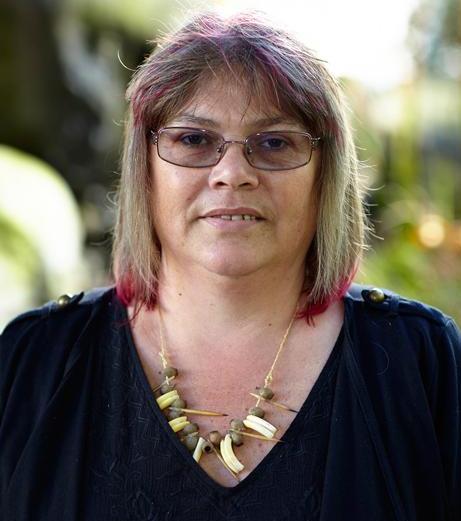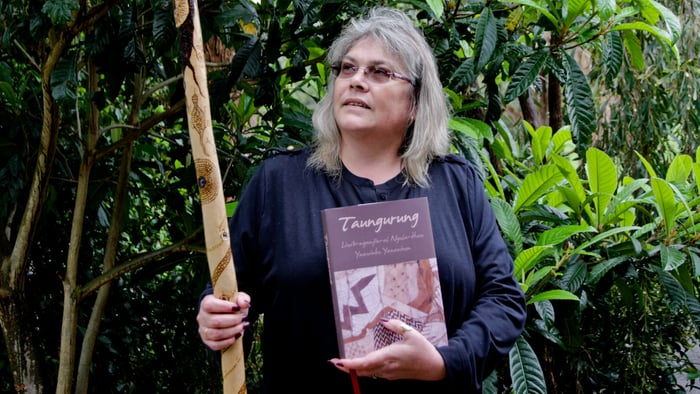My Country is Taungurung and I'm the Taungurung Language Specialist. I was born in Alexandra which is actually on Taungurung Country.
Article Source: Bunjilaka Melbourne Museum

Growing up in Healesville we never had any racism going on. We were just treated like everyone else. Every year we would go on holidays to Frasers National Park which is on Taungurung Country. They were the best days.
At the moment I'm studying Linguistics at Monash University and racism is very high. I've got another year and a half to go. I was so shocked that people teaching Indigenous Studies are non-Indigenous people. So I'm there now trying to put someone in there, to go get their PhD in Indigenous Studies and go and teach it. The young ones, not me - I'm too old.
The community wanted to see it and say it, and that was it. They've made it simple for themselves to bring that language back.
It's really opened my eyes going back to uni just seeing non-Indigenous and Indigenous people doing Indigenous Studies and sitting there listening to Elders tell stories. We've got young Indigenous students at Monash Uni that learn through Indigenous Studies because they've never gone through what I've been through, and they get excited about learning something new. It's very hard for a middle-aged student to go in and listen to all that again but I understand the young ones learning it. A lot of the non-Indigenous said they've only learned about the Stolen Generations at high school and that was only a little bit. It needs to go back further than Stolen Generations for them to understand before they get to uni. I think they will learn a lot more walking through First Peoples than probably six months of studying Australian history that Captain Cook was a good fella.
“I don’t think my mind stopped. It became my passion. I would get up at 3.30 in the morning and do it. I was doing it seven days a week.”
I started with Yulendj (the Melbourne Museum Bunjilaka Community Reference Group) and then I started Uni, and I had no time to get back to Yulendj. But I'm proud that I’ve been involved in it. My mum’s photos, videos and her stories were in the last exhibition of the museum and I just wanted to share what she gave me to this group. When I walked through First Peoples, I had goose bumps even though it wasn’t finished. It's going to be magnificent. It's really going to be magnificent. I can't wait to see it and I'm going to take a day off uni to go and do it.
When Aunty Lee Healy decided to make the first dictionary for the Taungurung language, she didn’t know what she was in for. The dictionary took four years to make.
The two Taungurung words that mean family for me are Gaan and Dhulin. Gaan, the cockatoo, is our family totem. When I say that word I can see my mum and my kids and it just brings us back together because my mum's not here anymore. My daughter Kaitlyn just turned 14 but when my Mum got sick she wasn't even at school. Kaitlyn and my Mum would sit there and play cards and they just got on like a house on fire. If she went in to hospital Kaitlyn would just sit with her all the time and Mum would tell stories and Kaitlyn would listen. Kaitlyn learned a lot of stories because my mum, having dementia, all she would do is go back in time. They were both on the same wavelength. So Gaan will bring myself, my mum and my daughter together. It's very short but it's powerful.
Dhulin is a lizard. My mum was the oldest in the family of 12 and my aunty was the youngest. My aunty and I were very close. Wherever she went, I went. We were like mother and daughter and she's not with us anymore either. I think it's the strength of Aboriginal women within that circle that I've built around these two words that keeps me going and I know my daughter will keep it going.
This does not sound like our Ancestors' language because of certain words that were coming in to us from the community. I said I don't know how long it's going to take but I want to do the research.
In 2007 my aunty retired and I took over the language. Before that we had a list of 300 words. We would have language camps on a yearly basis - people would go on Country and be involved in language. All of us were English speakers so that's how we were looking at those words, as English letters. When I took over from my aunty, I spoke to her and my mum and I said, there's got to be something in these letters that is not English. This does not sound like our Ancestors' language because of certain words that were coming in to us from the community. I said I don't know how long it's going to take but I want to do the research.


I sat there for nearly four years without any linguistic knowledge whatsoever, but with the help of the community linguist at VACL. I had 12 historical sources and different spellings for the one word. It would probably take me 45 minutes just to work out one word from all the different spellings and then once I'd got that all done, I would go back to the community. I'd give them options for a sound with a letter. Then the community decided on it. They were quite happy that I did all the background work because I was a community member as well. I was in the same boat - I wanted it to be easy. I wanted to just open up that book, have a look at that word and say it.
‘To see a word and say it’ is my community's motto. So the orthography in the dictionary is one sound, one letter. If it's a ‘gee’ sound, it's dj and if it's a ‘guh’ sound it's g.
The community wanted to see it and say it, and that was it. They've made it simple for themselves to bring that language back. I ended up with over four and a half thousand words. I'm so glad that I did what I did.
I remember when I first started doing the dictionary, the Gunai had their language and I was thinking, how come we have never done this before? We should be up where they are. And I think that just pushed me further and to get it done for my community. It didn't matter whether I was getting paid to do it or not, it just came from the heart. You can ask my husband, I'd be up at 3:30 in the morning if there was something on my mind. It was such passion and when my aunty was doing it before I took over, it was exactly the same thing. She wanted our language to come back in to circulation. Aunty Judy was the one that I looked up to. She was there when my mum had passed and the only thing that I wish is that they were alive to see the book. I dedicated it to my mum and my aunty and my uncle. It's here for future generations and that's what matters now.
Sources/Further Reading:

